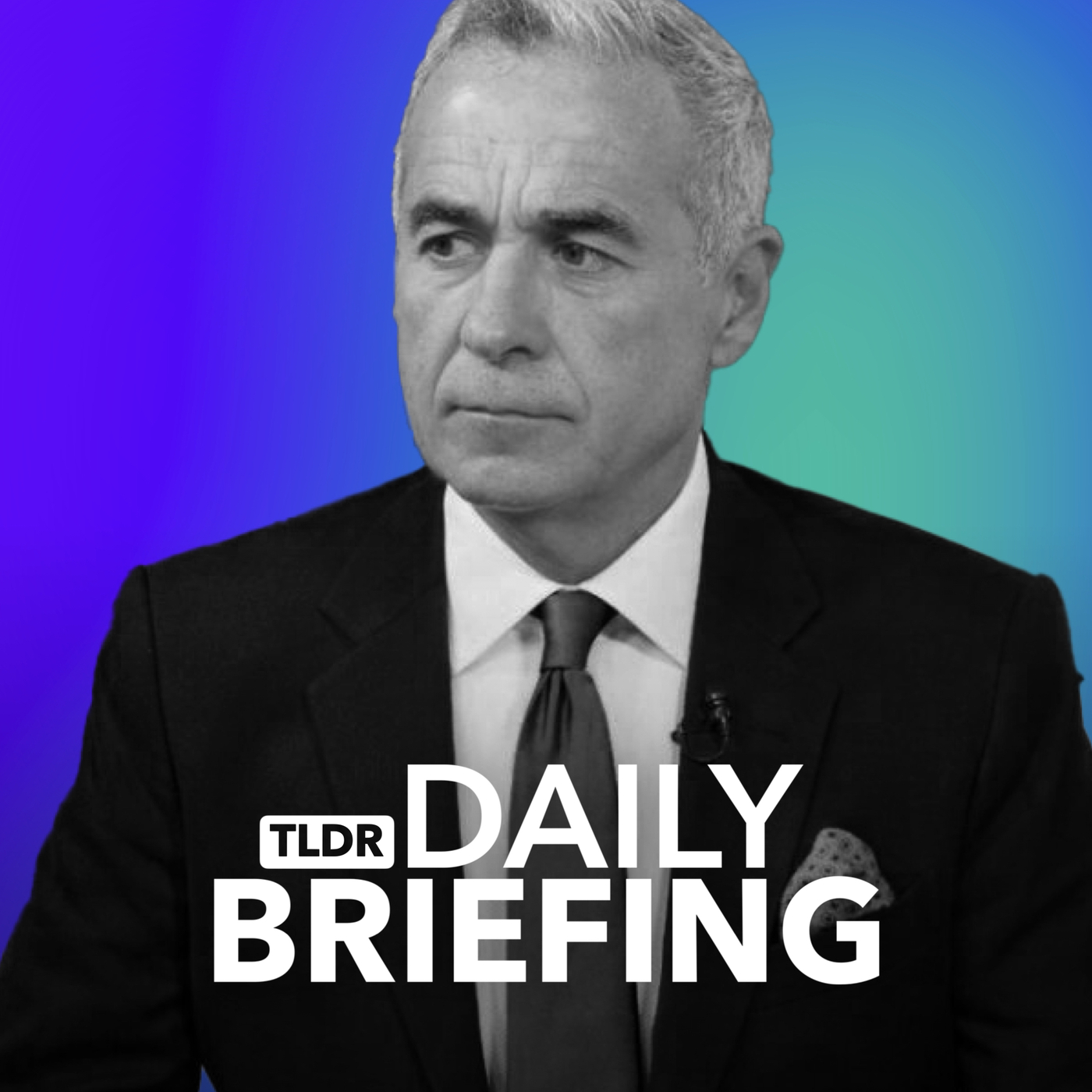
Deep Dive
- Kalin Georgescu, a far-right independent candidate, secured first place in Romania's presidential election.
- Georgescu's platform includes reducing dependence on imports, supporting farmers, and criticizing NATO and the EU.
- A second round of elections will be held on December 8th between Georgescu and Elena Lascone.
Shownotes Transcript
This video is brought to you by Brilliant. Today, shocking results in Romania's presidential election see a fringe far-right candidate come in first place, a DHL plane crashes in Lithuania, and Russia recruits Yemeni fighters for their war in Ukraine. From TLDR News, this is your daily briefing for Monday 25th November 2024.
Yesterday, Romania held the first round of its presidential elections, and the results have taken many by surprise. Virtually unknown independent candidate Kalin Georgescu, a far-right pro-Russia figure, emerged in first place with 22.9% of the vote. This election marks the end of Klaus Johannes' 10-year presidency, during which he solidified Romania's pro-Western stance but faced criticism for not adequately addressing corruption.
The outcome of this election has been one of the biggest surprises in Romania's post-communist political history. The leaders of the two largest parties, the leftist Social Democrats and centre-right Liberals, were eliminated in the first round. Georgescu had been polling between 5 and 6% prior to the election, making his strong performance unexpected.
In fact, polls had indicated that Prime Minister Marcello Ciolacu was the favourite to lead in the first round, while a close contest for second place was anticipated between George Simeon of the Right-wing Populist Alliance for the Union of Romanians and Elena Lascone of the reformist Union Save Romania . George Escu, a little-known university professor and former member of the hard-right AUR, capitalised on TikTok to connect with voters.
Deeply religious and nationalistic, he had faced significant backlash for past remarks supporting Romania's 20th century fascist legionary movement. His campaign emphasised reducing Romania's dependence on imports, bolstering support for farmers and boosting domestic food and energy production. Additionally, he's been a vocal critic of NATO, arguing that the EU and NATO fail to represent Romanian interests effectively.
Georgescu has even suggested that the US military industry has manipulated the context of Russia's war in Ukraine, a conflict that directly impacts Romania given its shared 650km border with Ukraine. At a time when Bucharest is under pressure to meet NATO funding commitments, Georgescu's stance is particularly concerning for NATO and the EU, as the president has a semi-executive role, which oversees defence expenditures.
Simeon, also from the far-right AUR party, finished fourth with 13.8% of the vote. Together, the far-right candidate secured nearly 30% of the total votes.
So what's next for Romania? Since no candidate achieved a majority of over 50%, a second round of elections is scheduled for December 8th, where Georgescu will face off against Elena Lascone from the centre-right USR. In the meantime, on December 1st, just a week before the presidential runoff, Romanians will cast their votes in parliamentary elections that will shape the future government and prime minister.
Now, in a Daily Briefing exclusive, our very own Jack Kelly is over in Busan, South Korea this week. So we thought we'd give him the opportunity to explain to you what's going on and why TLDR are attending.
Welcome to Busan, South Korea, where they're currently hosting the fifth session of the Intergovernmental Negotiating Committee to develop an international legally binding instrument on plastic pollution, including the marine environment. And if you're thinking that's a long title, it is abbreviated to INC5,
And I'm also just reading it off that building over there. Gathered here are delegates from nearly 180 countries, plus representatives and observers from civil society, environmental groups, private sector, and more, totaling some 3,800 participants. And this INC5 is the fifth, and in theory final session since 2022. Now, by the end of the week, they're hoping to have reached a landmark agreement on tackling the plastic pollution crisis.
But doing that could prove difficult. Already in the opening plenary session this morning, we saw disagreement on all kinds of things, not just on the final text and what will be agreed, but
even in how to reach that agreement, with disagreement between parties over whether a two-thirds majority or consensus is needed to agree these procedures. Another key question is how much the final text will focus on production as well as recycling and waste management. Now the issue of production is likely to be a key one, with countries like Russia and Saudi Arabia often resistant to reducing production of plastics
due to it being a key market for their oil. But overall, delegates have expressed motivation to work towards a final deal and recognise the historic potential of this moment to reach an agreement. A DHL cargo plane crashed into a house as it made its approach to land at Lithuania's Vilnius airport, killing one person, a Spanish citizen, and injuring three others on the aircraft.
All 12 people in the house survived. The flight was operated by Swiftair on behalf of DHL and had taken off from Leipzig, Germany, before the plane crashed at about 3am GMT time, a spokesperson for the National Crisis Management Centre said. Investigators are currently considering possible causes, including technical failure and human errors, but authorities have not ruled out the possibility of a terrorist attack.
Germany is investigating several fires caused by incendiary devices hidden inside parcels at a warehouse in Leipzig earlier this year, the country's prosecutor general said in October. British Counter-Terrorism Police said shortly afterwards that they were investigating a warehouse fire in July, caused by a package catching alight and liaising with other European law enforcement agencies to see if there was a connection with similar incidents elsewhere.
Moving to Russia now, where hundreds of Yemeni men have been recruited to fight for Putin in Ukraine. It's been reported by the FT this weekend that a shadowy trafficking operation exists to recruit the soldiers, and that it shows that Russia is increasing their links with the Houthis. Specifically, it's been reported that the recruits that travelled to Russia were promised high-salaried employment and citizenship. When they arrived, though, they were forcibly inducted into the Russian army and sent to the front line.
The fact that Russia is willing to go to the Houthis showed just how desperate Russia is for recruits and the lengths that Putin will go to in order to avoid a full mobilisation. He's already made a deal with North Korea for troops and the reports that as many as 11,000 North Koreans have already been deployed to Ukraine.
Finally, on Sunday morning, at the end of the COP29 climate summit in Baku, Azerbaijan, countries adopted a new deal on global climate finance, which will require richer countries to pay $300 billion a year to poorer countries over the next decade to help them deal with the impact of climate change.
This follows on from the previous deal under the 2015 Paris Agreement, for rich countries to pay $100 billion a year by 2020, which was fully reached in 2022 and which expires in 2025. However, the new deal was criticised by several developing nations for not being enough.
The G77 group, which comprises most of Latin America, Africa and Asia, said the original offer of $250 billion a year was a joke and signalled it would accept a $500 billion headline figure. But the revised offer of $300 billion still led to some parties, namely the Alliance of Small Island States, walking out of talks. This is because whilst developing countries are the most affected by climate change, they're also the least equipped to cope with it.
But despite some countries' dissatisfaction with what they perceive as slow progress, there was a landmark achievement made on carbon markets.
For context, the idea of a global carbon market that allows countries to meet their climate targets through buying and selling carbon credits, which are created through projects like planting trees or building wind farms, has been nearly a decade in the making, but progress at previous COP's have stalled. At COP29 though, two new rules were established creating two different types of market.
Article 6.2, which regulates bilateral carbon trading between countries, and Article 6.4, which creates a global crediting mechanism for countries to sell emissions reductions. The next major climate deadline is February 2025, when all countries have to submit new plans for how they will reduce their emissions.
Some countries, including the UK, Brazil and the UAE, submitted theirs during COP29, with the UK outlining an ambitious pledge to cut carbon emissions by 81% by 2035, compared to 1990 levels.
As you've hopefully realised after watching an 8 minute video explaining everything from Romania's election to the COP29 deal, you'll have noticed that here at TLDR News we're committed to helping you learn. Fortunately, the sponsor of today's video shares this commitment and is one of the best websites on the internet to help you learn new skills from the ground up. That website is, you guessed it, brilliant.
Now, one of the best things about Brilliant is rather than simply throwing information at you and testing you on it, Brilliant teaches you by doing. Each of their lessons is filled with hands-on activities in problem solving that helps you actually play with the concepts.
This is proven to be six times more effective than simply watching lecture videos. And what's more, Brilliant actually helps you do all of this learning wherever you are. You can complete their lessons on your phone, so you can easily utilize any spare minutes you have in the day with actually worthwhile learning.
You can try everything Brilliant has to offer for free for a full 30 days. So click on the link in the description. That way you'll also get 20% off an annual premium subscription. Thanks for watching the video and thanks to Brilliant for supporting this video.
